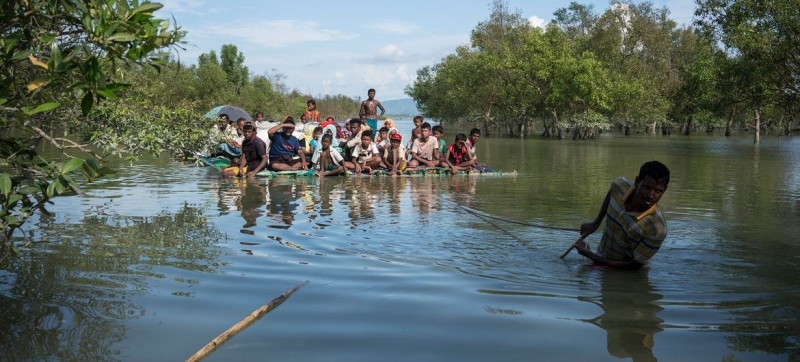- Developing countries united for a Just Transition Mechanism |
- UN Warns of Worsening Hunger Crisis Threatening Millions |
- Alamdanga’s disabled Zahurul sees the world through his hands |
- Touhid dismisses Indian media reports linking Dhaka for Delhi blast |
- IOM, HCI partner to combat human trafficking in Rohingya camps |
Rohingya tragedy, Gaza vaccination drive, new farm loans

Rohingya refugees arrive by makeshift raft from Myanmar to Noya Para, Bangladesh.
At least 21 Rohingya refugees, including two teenage girls, have died after a boat carrying up to 70 people capsized in the Andaman Sea off the coasts of Malaysia and Thailand, according to UN agencies.
Thirteen survivors have been rescued by Malaysian authorities, but dozens remain missing. Another vessel with about 230 people on board is reportedly still at sea, raising fears of further tragedy.
Thousands of Rohingya refugees continue to risk perilous journeys across the Bay of Bengal and the Andaman Sea in search of safety, as conditions worsen in camps in Bangladesh and in conflict-affected Myanmar.
Mounting death toll
The UN Refugee Agency (UNHCR) and the International Organization for Migration (IOM) expressed deep concern over the growing loss of life, noting that more than 600 people have already died or gone missing at sea this year.
Women and children account for over two-thirds of those making these dangerous crossings. The agencies praised rescue efforts by Malaysian authorities and local communities and urged stronger regional cooperation to enhance search-and-rescue capacity, ensure safe disembarkation, and address the root causes of displacement in Myanmar.
Gaza: Vaccination campaign launched as immunisation rates drop
In Gaza, a catch-up immunisation, nutrition and health campaign is underway to reach over 40,000 children under three who missed routine vaccines during two years of conflict.
UNICEF warned on Tuesday that vaccination rates in the enclave have fallen below 70 per cent – a critical threshold for preventing disease outbreaks.
The campaign, which began over the weekend, has already reached thousands of children. It will be conducted in three phases – this month, December and January.
UNICEF spokesperson Ricardo Pires said that before the war, Gaza had 98 per cent vaccination coverage and 55 immunisation sites. “Now coverage has fallen below 70 per cent, with 31 vaccination facilities destroyed or damaged,” he added.
As a fragile ceasefire holds, Pires noted that the biggest challenge is delivering essential medical supplies, including 1.6 million syringes, most of which remain outside the enclave.
Between Friday and Monday, the UN Office for Project Services distributed more than 619,000 litres of diesel to support critical humanitarian operations, including water, sanitation, health, education, nutrition and protection services.
Between 1 November and Sunday, UN partners in Gaza provided food assistance to some 255,000 people, distributing two food parcels per household. “One month into the ceasefire, our partners are distributing about 160,000 bread bundles each day, produced by 19 UN-supported bakeries, nine of which are in northern Gaza,” said Deputy Spokesperson Farhan Haq.
Lending initiative boosts small farmers’ access to credit
A UN-backed lending initiative has been launched to help small-scale farmers and producers in the Sahara and beyond who face difficulties obtaining business loans.
Announcing the initiative on Tuesday, the Food and Agriculture Organization (FAO) said that growers often struggle to access credit because agriculture is perceived as a risky sector due to exposure to climate shocks and price volatility.
With the European Union providing guarantees worth €109.5 million, Italy’s public development bank CDP will now extend credit to approved lenders in Africa and Türkiye.
The FAO will offer technical expertise in food, agriculture and finance to support local lenders. “Knowledge is the best de-risking instrument,” said FAO Director-General Qu Dongyu.

